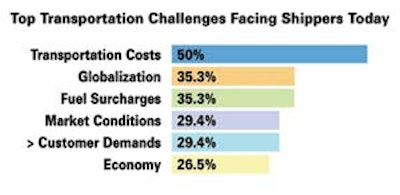
A soft economy, increasing global competition, major concerns for infrastructure and congestion. These are just a few of the biggest challenges that have a direct impact on U.S. transportation. But according to the 2008 NASSTRAC Member Survey, currently there are five primary issues that are top-of-mind with shippers:
1. Transportation costs. Along with death and taxes, transportation buyers can be sure that rising transportation costs are a guarantee in life. Citing the obvious factors that include rising fuel costs, approximately 50 percent claim increasing transportation costs to be of major concern. Many shippers continue to explore opportunities in such practices as pool consolidation, cross-docking and mode/carrier selection as part of the solution.
2. Globalization. With the growth of international trade, the globalization of production and offshoring, international transportation systems have been under increasing pressures to support increasing demands. In fact, 35.3 percent of respondents say that globalization is one of their biggest concerns. Expanding their capabilities via outsourcing to global third-party logistics providers is one way that shippers are ensuring that they can navigate through the challenges of managing transportation in a global marketplace.
3. Fuel surcharges. The common practice of charging fuel surcharges is of significant concern for shippers. In fact, more than 35 percent of respondents list this as one of their biggest concerns. Most agree that, when it comes to rising fuel costs, there will be no end in sight.
4. Market conditions. Nearly 29.5 percent of shippers cite current market conditions on their top list of concerns. With the goal of a growing economy comes the requirement of a transportation system that can move people, goods and services quickly and efficiently. To meet this challenge, each transport sector must work effectively both by itself and as part of a larger, interconnected whole. Technologies that increase the speed, reliability and cost-effectiveness of the transportation sector also will increase the economy's competitiveness and ability to create jobs. Unfortunately, one of the greatest challenges we face today is to rehabilitate and properly maintain the huge stock of infrastructure facilities already in place. Providing a world-class transportation sector will require the United States to meet the challenges posed both by increased congestion in many parts of the transportation system and by the need to rebuild and maintain a public capital stock valued at more than $2.4 trillion.
5. Customer demands. Lastly, 26.5 percent of respondents claim that the demands of the marketplace are top of mind for them. This entails demands to maintain costs of materials and/or product landed costs, ensuring efficiencies in the supply chain, quality service and ultimate delivery of a quality product, on-time. But a myriad of challenges create havoc for shippers in meeting the stringent demands of customers, including capacity challenges, infrastructure and congestion, to name a few.
So what can shippers do to meet these types of concerns head-on? Stay active with industry associations such as NASSTRAC, and leverage your involvement and advocacy as these organizations lobby on behalf of shippers for such key issues as hours of service, highway-related legislation, cross-border and security issues, and the end of collective rate-making. In addition, make sure to keep "carrying the torch" to the boardroom, convincing top management of the strategic value of transportation and logistics in any company — ultimately gaining adequate budget and resources to make it all happen.




![Pros To Know 2026 [color]](https://img.sdcexec.com/mindful/acbm/workspaces/default/uploads/2025/08/prostoknow-2026-color.mduFvhpgMk.png?auto=format%2Ccompress&bg=fff&fill-color=fff&fit=fill&h=100&q=70&w=100)





![Pros To Know 2026 [color]](https://img.sdcexec.com/mindful/acbm/workspaces/default/uploads/2025/08/prostoknow-2026-color.mduFvhpgMk.png?ar=16%3A9&auto=format%2Ccompress&bg=fff&fill-color=fff&fit=fill&h=135&q=70&w=240)




